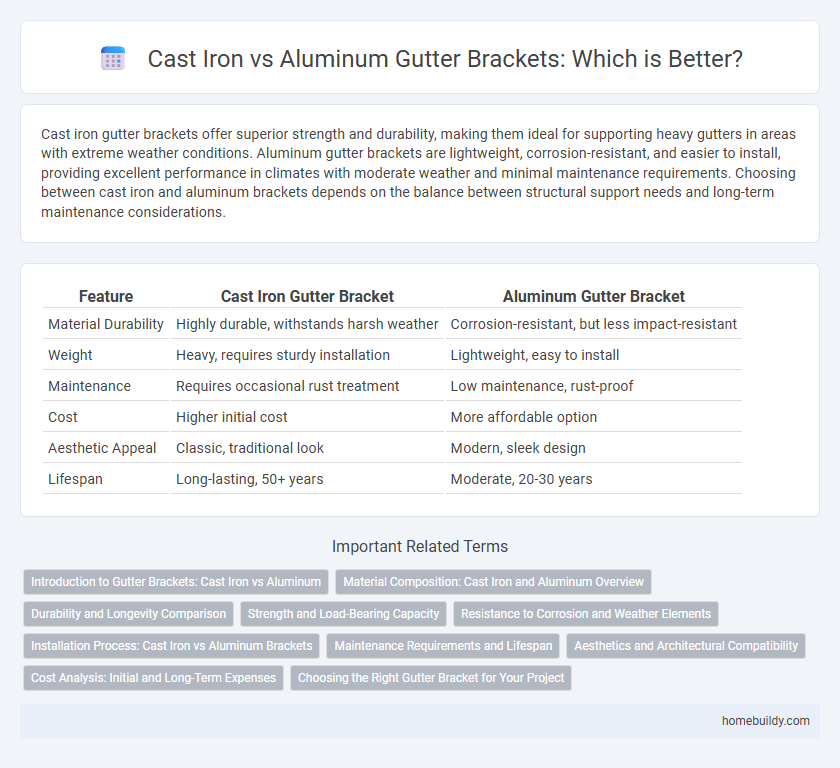Cast iron gutter brackets offer superior strength and durability, making them ideal for supporting heavy gutters in areas with extreme weather conditions. Aluminum gutter brackets are lightweight, corrosion-resistant, and easier to install, providing excellent performance in climates with moderate weather and minimal maintenance requirements. Choosing between cast iron and aluminum brackets depends on the balance between structural support needs and long-term maintenance considerations.
Table of Comparison
| Feature | Cast Iron Gutter Bracket | Aluminum Gutter Bracket |
|---|---|---|
| Material Durability | Highly durable, withstands harsh weather | Corrosion-resistant, but less impact-resistant |
| Weight | Heavy, requires sturdy installation | Lightweight, easy to install |
| Maintenance | Requires occasional rust treatment | Low maintenance, rust-proof |
| Cost | Higher initial cost | More affordable option |
| Aesthetic Appeal | Classic, traditional look | Modern, sleek design |
| Lifespan | Long-lasting, 50+ years | Moderate, 20-30 years |
Introduction to Gutter Brackets: Cast Iron vs Aluminum
Cast iron gutter brackets offer exceptional strength and durability, making them ideal for supporting heavy gutters in traditional architectural styles. Aluminum gutter brackets provide lightweight corrosion resistance, perfect for modern installations requiring ease of handling and rust-free performance. Choosing between cast iron and aluminum depends on factors such as load-bearing needs, environmental exposure, and aesthetic preferences.
Material Composition: Cast Iron and Aluminum Overview
Cast iron gutter brackets are composed primarily of iron combined with carbon, offering exceptional strength and durability, ideal for supporting heavy gutters in traditional or heavy rainfall areas. Aluminum gutter brackets consist of a lightweight aluminum alloy, providing resistance to rust and corrosion, making them suitable for modern installations and coastal environments. The choice between cast iron and aluminum materials influences factors such as weight, maintenance requirements, and longevity in different environmental conditions.
Durability and Longevity Comparison
Cast iron gutter brackets offer superior durability and longevity due to their robust, corrosion-resistant composition, often lasting over 50 years with minimal maintenance. Aluminum gutter brackets, while lightweight and resistant to rust, typically have a shorter lifespan of 20 to 30 years and may be more susceptible to bending under heavy loads. For long-term performance and structural strength, cast iron outperforms aluminum in high-stress or harsh weather conditions.
Strength and Load-Bearing Capacity
Cast iron gutter brackets offer superior strength and load-bearing capacity compared to aluminum brackets, making them ideal for heavy-duty applications in regions with heavy rainfall or snow. The dense material composition of cast iron provides enhanced durability and resistance to deformation under substantial weight. Aluminum gutter brackets, while lighter and corrosion-resistant, typically support less load and may require more frequent reinforcement in high-stress environments.
Resistance to Corrosion and Weather Elements
Cast iron gutter brackets exhibit superior resistance to corrosion due to their dense composition and protective coatings, making them highly durable in harsh weather conditions and prolonged exposure to moisture. Aluminum gutter brackets offer excellent resistance to rust as they naturally form a protective oxide layer, which enhances their longevity in environments prone to rain and humidity. Both materials perform well against weather elements, but cast iron provides a sturdier option for extreme climates, whereas aluminum is favored for lightweight corrosion resistance.
Installation Process: Cast Iron vs Aluminum Brackets
Cast iron gutter brackets require more effort during installation due to their heavier weight and need for precise alignment with masonry surfaces, often involving drilling into brick or stone. Aluminum gutter brackets are lighter and easier to handle, enabling quicker installation with standard screws or rivets on wood or metal fascia boards. The installation process for aluminum brackets is generally faster and less labor-intensive, making them ideal for projects with time constraints.
Maintenance Requirements and Lifespan
Cast iron gutter brackets require minimal maintenance due to their durability and resistance to corrosion, often lasting over 50 years with occasional rust prevention treatments. Aluminum gutter brackets need more frequent inspections and cleaning to prevent oxidation, generally lasting around 20 to 30 years with proper upkeep. The longevity of cast iron outperforms aluminum, especially in harsh weather conditions, making it a preferred choice for low-maintenance, long-lasting gutter support.
Aesthetics and Architectural Compatibility
Cast iron gutter brackets offer a traditional, ornate appearance that enhances classic and historic architectural styles, adding a sense of durability and elegance. Aluminum gutter brackets provide a sleek, modern look that complements contemporary designs with their lightweight and corrosion-resistant properties. Choosing between cast iron and aluminum gutter brackets depends on the desired aesthetic harmony with the building's architectural character and style.
Cost Analysis: Initial and Long-Term Expenses
Cast iron gutter brackets typically demand higher initial costs due to the material's weight and manufacturing complexity but offer superior durability that reduces long-term replacement expenses. Aluminum gutter brackets, while more affordable upfront and easier to install, may incur higher maintenance costs over time owing to susceptibility to corrosion and potential deformation. Evaluating both options requires balancing immediate budget constraints with projected lifespan and upkeep investments to determine the most cost-effective solution.
Choosing the Right Gutter Bracket for Your Project
Cast iron gutter brackets offer exceptional durability and strength, making them ideal for heavy-duty or historic-style projects that require robust support and long-lasting performance. Aluminum gutter brackets, by contrast, provide lightweight, corrosion-resistant benefits suited for modern installations where ease of handling and weather resistance are priorities. Selecting the right gutter bracket depends on project requirements such as load capacity, aesthetic preferences, and environmental conditions to ensure optimal gutter system functionality.
Cast iron gutter bracket vs aluminum gutter bracket Infographic

 homebuildy.com
homebuildy.com